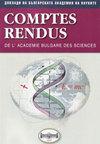Polycyclic Aromatic Hydrocarbons (PAHs) in Bulgarian Coals: Occurrence, Distribution and Carcinogenicity
IF 0.3
4区 综合性期刊
Q4 MULTIDISCIPLINARY SCIENCES
Comptes Rendus De L Academie Bulgare Des Sciences
Pub Date : 2023-08-29
DOI:10.7546/crabs.2023.08.08
引用次数: 0
Abstract
The study fills the informative gap on occurrence, distribution, and carcinogenicity of polycyclic aromatic hydrocarbons (PAHs) in Bulgarian coals. It presents quantitative data for content and carcinogenicity of PAHs in different rank raw coals from eight basins with geological age from Late Carboniferous to Late Miocene, Ro=0.17–5.20%. The high amounts of alkylated naphthalene and alkylated phenanthrene determined in the bituminous coals reflect the diagenetic conversion of the plant-derived terpenoids into alkylated PAHs. In this first systematic study of PAHs in Bulgarian raw coals three concentration ranges are established: for Miocene/Eocene age coal – from 1.08 mg/kg to 5.79 mg/kg; for Late Cretaceous/Late Carboniferous age coal – from 77.9 mg/ kg to 137.2 mg/kg; and, for the Late Carboniferous coal – 1.85 mg/kg. The relationship of the total PAHs content vs. raw coal Ro shapes as a “bell” and matches with the published data for the native PAHs from all over the world provenance. The maximal PAHs amount of 137.2 mg/kg at Ro =0.96% for the Late Cretaceous coal lies within the “oil-generation window”, Ro =0.5–1.3% for the kerogen. For all raw coal studied relatively low carcinogenicity is determined based on the well correlated values for B[a]Peq and TEQ parameters.保加利亚煤中的多环芳烃(PAHs):赋存、分布和致癌性
该研究填补了保加利亚煤中多环芳烃(PAHs)的发生、分布和致癌性方面的信息空白。给出了地质年代为晚石炭世至晚中新世的8个盆地不同等级原煤中多环芳烃含量和致癌性的定量数据,Ro= 0.17-5.20%。烟煤中高含量的烷基化萘和烷基化菲反映了植物萜类化合物在成岩作用下转化为烷基化多环芳烃;在对保加利亚原煤中多环芳烃的首次系统研究中,确定了三个浓度范围:中新世/始新世煤-从1.08 mg/kg到5.79 mg/kg;晚白垩世/晚石炭世煤-从77.9 mg/kg到137.2 mg/kg;晚石炭世煤为1.85 mg/kg。多环芳烃总含量与原煤Ro的关系呈“钟形”,与世界各地来源的原生多环芳烃的已发表数据相匹配。晚白垩世煤在Ro =0.96%时多环芳烃含量最大,为137.2 mg/kg,处于“生油窗口”内,干酪根Ro =0.5 ~ 1.3%。对于所有研究的原煤,基于B[a]Peq和TEQ参数的良好相关值确定了相对较低的致癌性。
本文章由计算机程序翻译,如有差异,请以英文原文为准。
求助全文
约1分钟内获得全文
求助全文
来源期刊
CiteScore
0.60
自引率
33.30%
发文量
181
审稿时长
3-6 weeks
期刊介绍:
Founded in 1948 by academician Georgy Nadjakov, "Comptes rendus de l’Académie bulgare des Sciences" is also known as "Доклади на БАН","Доклады Болгарской академии наук" and "Proceeding of the Bulgarian Academy of Sciences".
If applicable, the name of the journal should be abbreviated as follows: C. R. Acad. Bulg. Sci. (according to ISO)

 求助内容:
求助内容: 应助结果提醒方式:
应助结果提醒方式:


